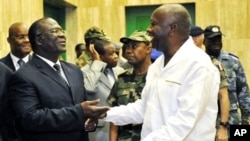Ivorian mediators meeting in Ouagadougou this week decided that the long-delayed presidential poll in Ivory Coast should take place at the end of February or early March of next year.
Ivorian President Laurent Gbagbo and former rebel leader and current Prime Minister, Guillaume Soro, met in Ouagadougou this week with Burkinabe President and facilitator, Blaise Compaoré, in what has become yet another chapter in the country's tortuous path towards a presidential election.
It was the sixth meeting of the so-called Permanent Consultation Forum, created as result of the 2007 Ouagadougou peace accords. Also in attendance were top Ivorian opposition candidates, Henri Konan Bédié and Alassane Ouattara.
The vote is an attempt to find a lasting political solution to nearly a decade of internal conflict in the once stable West African nation. It was supposed to take place last Sunday, but irregularities with the voter list caused it to once again be pushed back.
Countries like the United States and France have called on Ivory Coast to hold elections as soon as possible, and opposition members have urged the government to set a new date.
Arriving in Burkina Faso on Tuesday, President Gbagbo said that holding a successful, peaceful poll is more important than rushing into a hasty, and potentially divisive, one.
Mr. Gbagbo says he wants to hold elections that don't lead to another outbreak of war. Better to hold elections late, he says, and not have a conflict than to have elections quickly that result in deaths. He says people are tired of crying for their dead.
Civil war cut the nation in half in 2002 and claimed thousands of lives. The country has since missed deadlines for presidential elections set by the 2007 peace accords that created a transitional, power-sharing government.
Voter registration issues, particularly issues of nationality and voter eligibility, have prompted Ivory Coast to push back the election several times since President Gbagbo's mandate ran out in October 2005.
Though Mr. Gbagbo has been accused of delaying the elections to remain in power, he blamed technical problems for the most recent setback and said about one month's worth of work remained.
Mr. Gbagbo says it should not be a question of the date but rather the work that remains to be done. Today, he says we are clearing the provisional voter list of more than a million voters whose eligibility is still being contested and the names of others that are incorrect on the list.
At the end of this week's two-day meeting, mediators set forth a timetable for the poll that included publishing a final voter list in January 2010. Voter cards should then be distributed in February, they said, and campaigning should begin.
Security for the coming poll is another concern, and mediators once again urged the continued disarmament and reintegration of the country's former rebel factions. The commission also reached agreements on other points of contention, such as ensuring equal access for political parties to state media before and during the electoral process.
The country's Independent Electoral Commission has not yet set a new date for elections.
News
Ivorian Mediators Push For Early 2010 Vote
update

Ivorian mediators meeting in Ouagadougou this week decided that the long-delayed presidential poll in Ivory Coast should take place end of February or early March of next year.



